 Klik sini untuk membeli Buku dan VCD Keadilan terbaru !
Klik sini untuk membeli Buku dan VCD Keadilan terbaru !

Bangkitlah Kaum Buruh & Petani
Menentang Ekstremis & Hipokrits!
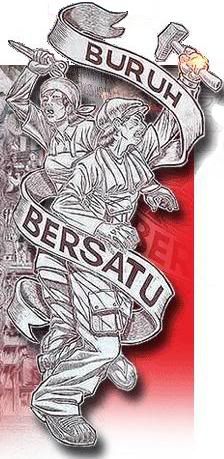
~ faisal mustaffa online ~
Friday, May 09, 2008
More Reviews on SELAK in Blogs
Alphabet Soup Saturday
Technorati tags: KLAB 2008 , KL Alternative Bookfest 2008
, KL Alternative Bookfest 2008 , Central Market Annexe
, Central Market Annexe , World Press Freedom Day
, World Press Freedom Day , Farish Noor
, Farish Noor
KLAB, WPFD, CMA, DTD, AFG, FAN... it was a Saturday filled with all of these TLA's. Not that it was a bad thing. On the contrary, yesterday was one of the more memorable Saturdays Walski's had in a long while... Oh, and don't worry - the TLA's (Three-Letter Acronyms) will get expanded along the way. By the way, if you acronymized the post title, it would be ASS.
As mentioned in his last post, Walski and the Mrs made our way to the KL Alternative Bookfest (KLAB) 2008, at the Central Market Annexe. It's been a while since Walski's been to CM, and today was a day chock-full of events.
There were at least four events going on concurrently, apart from KLAB 2008 - World Press Freedom Day (WPFD), the Dong Tai Du (DTD - Attitude Movement - a Chinese indie rock revival) festival, and of course, Farish A. Noor's lecture, the second in the Other Malaysia
(DTD - Attitude Movement - a Chinese indie rock revival) festival, and of course, Farish A. Noor's lecture, the second in the Other Malaysia series of public lectures. On top of that, there was also the second Art for Grabs event
series of public lectures. On top of that, there was also the second Art for Grabs event .
.
Minor Post-Length Warning: This is a longish post with lots of pictures - most of them in the expanded full post. Just so you know...
Walski and the Mrs got to Central Market a little later than planned, as they had some errands to run earlier in the day. Being that it was World Press Freedom Day, we headed to the press freedom (or lack of it, to be more precise) gallery.
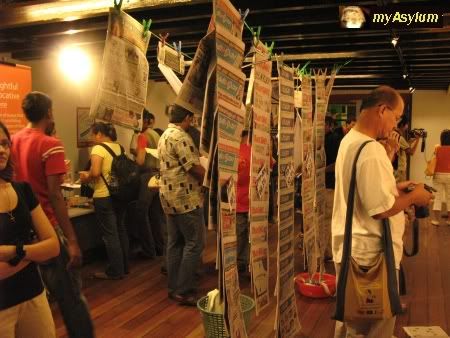 BN coverage vs. Opposition coverage in the press...
BN coverage vs. Opposition coverage in the press...
The centerpiece was a newspapers-on-clothesline display, where a percentage of coverage given to non-BN entities, versus BN, was scribbled on the copies of newspapers. Needless to say, the MainStream Media (MSM) is still pretty much lopsided in their reporting.
One of the book launches (four in total over Saturday and Sunday) that we had initially planned to attend was SELAK, a pictorial coffee table book documenting the electoral reform campaign spearheaded by Bersih . Unfortunately, we got there just in time to see the audience pour out.
. Unfortunately, we got there just in time to see the audience pour out.
(more TLAs and the Saturday adventure, in the full post)
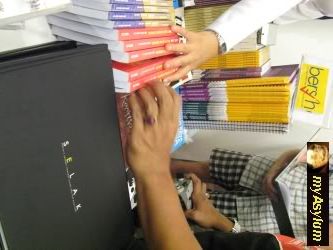 Saw Haris Ibrahim there (he facilitated the launch event), but didn't get a chance to chat, as he was pretty engrossed in the conversation he was having. We acknowledged each other, nevertheless. Understandably, events like these are not the most conducive to have extended chats with friends. Especially when they're involved with the event organization. Walski's been in similar situations, so it's quite understandable.
Saw Haris Ibrahim there (he facilitated the launch event), but didn't get a chance to chat, as he was pretty engrossed in the conversation he was having. We acknowledged each other, nevertheless. Understandably, events like these are not the most conducive to have extended chats with friends. Especially when they're involved with the event organization. Walski's been in similar situations, so it's quite understandable.
Regardless, one of the purchases Walski made yesterday was this new Bersih book. Haven't had a chance to go thru it properly yet. Glossing through it, it's more than just a pictorial review of the historical November 10 rally. It also gives the reader an overview of who and what Bersih is all about.
If you only know Bersih through the MSM (shame on you), then is is a good book to add to your coffee table book collection. And it's actually quite un-pricey for a hardcover glossy book... only RM 60. Sure, that may deprive you of a few Cheeseburger meals at McD's, but at least it's a lot more affordable and light-years more meaningful than the Uncle Sam one...
From there, we went on a wander-spree around the Annexe, visiting some of the Art For Grabs (AFB) stalls set up there. As Walski may (or may not) have mentioned in the past, the Mrs and him are pretty interested in art. One of the things we've been thinking of doing - sometime in the foreseable, but yet unscheduled, future - is to gather a small grouping of undiscovered Malaysian artists, and organize an art show. Yesterday was good because we managed to chat with a few young artists with a lot of talent.
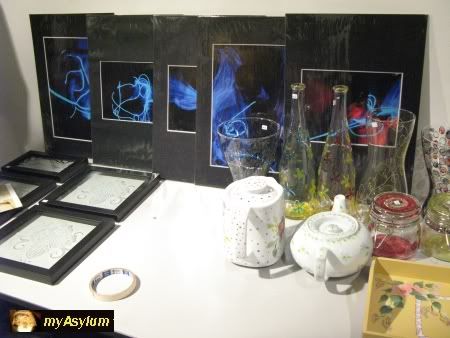 Fantasy Photo Art by Triff (roll of tape not included)
Fantasy Photo Art by Triff (roll of tape not included)
AFB is good exposure for them. And for that we have to thank the CMA. As Walski mentioned in the post preceeding this, he feels that Central Market Annexe is the pivot of cool in Kuala Lumpur. Any interested politician who's really sincere in wanting to know what makes the younger generation tick should come visit sometime. Particularly the BN ones who frequently portray themselves as individuals who are totally out of touch with reality. The real reality, and not the made-up political reality they find themselves living in.
The hightlight of yesterday, and one of the key reasons why Walski was there, came about at 3pm. Okay, 3pm plus the obligatory Malaysian-Time slight delay. Walski's talking about the Farish A. Noor (FAN) public lecture. This was the second in The Other Malaysia Public Lecture Series, entitled "The Lost Tribes of Malaysia: The Construction of Race Politics from the Colonial Era to the Present".
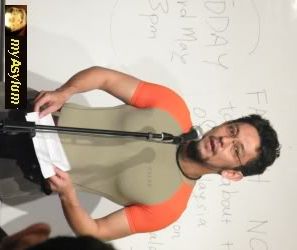 Walski has no intention to write extensively on Farish's lecture here, primarily because that would justifiably require an entire post (and two-third's), to be fair and comprehensive. Rather, Walski will try to summarize the gist of the hour-some long lecture, articulately delivered by one of Malaysia's more prominent academics (in Walski's book, at least).
Walski has no intention to write extensively on Farish's lecture here, primarily because that would justifiably require an entire post (and two-third's), to be fair and comprehensive. Rather, Walski will try to summarize the gist of the hour-some long lecture, articulately delivered by one of Malaysia's more prominent academics (in Walski's book, at least).
The current Malaysian political environment is one that still gravitates around race. Like it or not. Even with the upheaval meted out by the (now) Pakatan Rakyat, rhetorics of race are still abundant, if not from Pakatan per se, from the various special interest groups and from the still-incumbent BN. But the idea of race, Farish argues, is one that is actually alien to the region, prior to the colonial period, before the arrival of the British and Dutch. Not so much the Portugese, however.
Reason? The injection of race into this region coincides with the increased awareness of pseudo-scientific studies of racial difference that started dominating the European intelligentsia of the mid-18th to late 19th century. Meaning, that it was way after the arrival and departure of the Portugese in South-East Asia.
It was during the colonial period of pre-independence Malaya that the lumping of a myriad of cultures existent then, began. Using a table extracted from a 1987 article in the Journal of Asian Studies ("The Meaning and Measurement of Ethnicity in Malaysia" by Charles Hirschman), Farish demonstrates how the true multicultural environment that existed then was slowly genericised into four major categories of "Malay", "Chinese", "Indian" and "European". Over the period of four census exercises, done between 1871 to 1931 at 20-year intervals, we can see that the rich landscape of the region, at the time a melting-pot of cultures in the true sense, while being carefully categorized, were in fact being flattened into four "neat" categories.
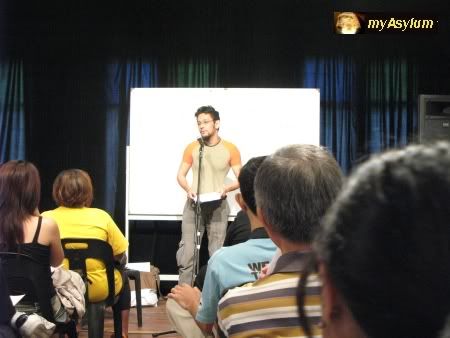 The highlight of Walski's alphabet soup Saturday...
The highlight of Walski's alphabet soup Saturday...
For example, in the 1931 census, what constituted as "Malay" included such diverse cultures as Javanese, Boyanese, Achinese, Bataks, Minangkabaus, Bugis, Dayaks, and a multitude of other very distint cultures. In the process of categorization, an oversimplification occured - one that continues to exist today. The census-takers at the time had problems with instances where a person was the product of a cross-cultural intermingling, and therefore if you were, for example, part Minangkabau, part Hakka, and part Arab, you had to choose which rigid categorization you had to belong to.
Fast-forward to today, one would have a problem if he or she were the product of a union of Arab-Malay-Indian-Chinese (like Walski actually is), wanted to maintain his/here rich heritage, and tried to apply for a MyKad. There aren't such hybrid categories available for you to choose from. Instead, you would have to choose to be one of the generic models, like it or not. Incidentally, like Walski, Farish, too has not changed to the de-humanizing myKad, as the good Professor admitted during the lecture.
In any case, it is this stratification of society into an artificial, easily categorized heirarchy that remains as a legacy of our colonial governors. Ironically, as Farish points out, the very methods of divide-and-rule that the independence seekers fought against, were employed by post-colonial governments across the region. Malaysia being no exception. And that legacy is what Malaysia's political landscape is built upon today.
Of course, a lot of details and nuances of Farish's lecture have been left out here, for the sake of brevity. That one hour plus simply breezed by unnoticed, as Walski and the Mrs were immersed in a walk-back into history, unlearning what we take for granted to be our reality today. It's all artificial.
Incidentally, long after the lecture, on our way to dinner with some friends, the Mrs remarked that she felt Farish should have not left the end of the lecture open ended - she wanted to know what the next step should be, if we want to undo what Malaysia has today become. Walski argued that it is probably outside of what Farish wanted to convey. And perhaps, in part to answer the Mrs' question(s), it is pertinent that Walski should include here the closing paragraphs from Farish's lecture notes:
"Cognisant of the fake and false premises that have underwritten our national history and collective narrative for so long, we retain, nevertheless, the need for a new national myth for a new Malaysia. But should we garner the courage and moral will to reject once and for all the fallacy of racial difference for the ideological conceit that it is, what will be the premise of our new national history, our new national story? Where will be the frontiers of the new Malaysia? And what will the new Malaysian look like?
None of us can answer these questions for certain, for the national narrative of any nation is forever a case of work in progress. Nations are constructs, and based on the collective imagination and imaginary of its citizens. But as a nation in the making and under construction, we should at least have the courage to admit that some of our earlier premises were wrong (if not dangerous) and that the time has come to reinvent ourselves with some degree of hindsight and collective wisdom. For now, however, one fo the first steps that has to be taken is to recognise and accept the fact that much of what we have been told as the first generation of postcolonial Malaysians was false, and that these instrumental fictions were in fact the tools that were used to mentally bind us. The rejection of the notion of simplified racial differences may not lead us to the promised land of a new plural and democatic Malaysia, but it would be the first step in liberating our minds from the shackles of a colonial governmentality that should have been rejected half a century ago.
If you're a sci-fi fan like Walski, these two paragraphs immediately brought to mind The Matrix - the next step is to undo the entrenched fallacies that have collectively become our current Malaysian reality. The next step, therefore, would be for all of us to take the Red Pill
- the next step is to undo the entrenched fallacies that have collectively become our current Malaysian reality. The next step, therefore, would be for all of us to take the Red Pill ...
...
But the best part of yesterday's Farish Noor experience was to get to meet the guy. Not that the lecture wasn't fantastic in itself, but Walski's been wanting to meet Farish for a long time now, and thanks to Marina M. (who also happened to be at KLAB, etc.), he got the chance yesterday. Too bad it wasn't really a conducive time to talk to Farish more. Maybe next time.
(who also happened to be at KLAB, etc.), he got the chance yesterday. Too bad it wasn't really a conducive time to talk to Farish more. Maybe next time.
So, after Farish's lecture session, we headed down to the forum on Book Banning, organized by Sisters in Islam. Because the lecture ran overtime, with the Q&A session and all, we got to the forum just as Astora Jabat was finishing his 15 minutes. And that was after V. Gayathry, Director of CIJ (Center for Independent Journalism) had spoken. We only managed to catch the last scheduled speaker, Norhayati Kaprawi (from Sisters in Islam).
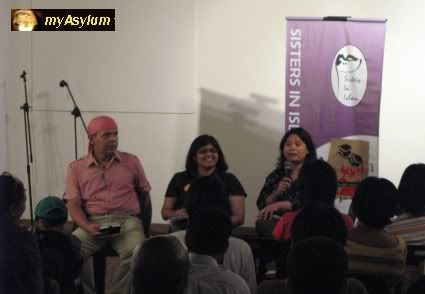 The panel (L-R): Astora Jabat, V. Gayathry & Norhayati Kaprawi
The panel (L-R): Astora Jabat, V. Gayathry & Norhayati Kaprawi
Now, anyone who's been following this blog for more than 6 months would probably know Walski's stand on censorship. He fucking hates it, for those of you who haven't. Particularly in this day and age when a lot of stuff is available online on the Internet anyway.
In Malaysia's case, as many of us have surmised, book banning is usually on the basis of being against "Islam" - one way or another, it usually boils down to that. Walski's put quotes around "Islam" (for added effect, imagine Dr. Evil and his hand gestures when you say the "word") for a reason - in Malaysia, the only "correct" version of Islam is the one that KDN, with the various religious departments in tow, deems correct. Anything not agreeing with their interpretation is deemed deviant. Books that promote different opinions or different ways of looking at Islam, or even books that these numbskulls deem threatening, are banned. No questions asked. No review, no argument. Period.
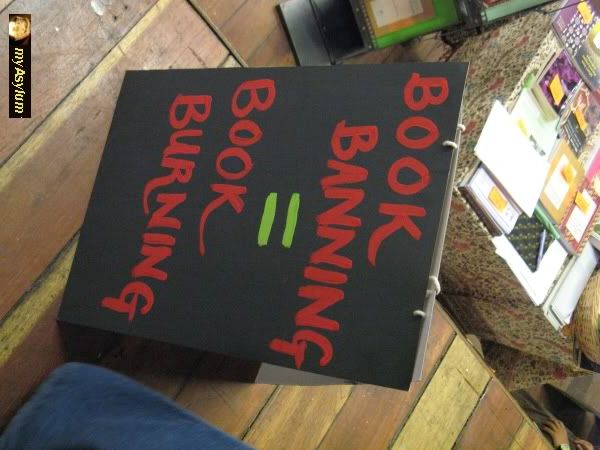 Initially, a representative from the Ministry of Home Affairs (KDN) - the government organ responsible for book banning in this country - was supposed to have been one of the panelist. However, either the representative was too chickenshit to identify himself/herself, or worse, didn't bother attending. What's the point when there's no discussion over what gets banned, right? Plus, it would be a waste of oxygen to have these pencil pushers participate anyway... it's not like they would be able to explain policy, or for that matter, defend themselves from the likely public outcry. It's best that they don't know how the public feels, and pretend, in the same breath, that all these book bannings are for the public's good. No review, no argument. Period.
Initially, a representative from the Ministry of Home Affairs (KDN) - the government organ responsible for book banning in this country - was supposed to have been one of the panelist. However, either the representative was too chickenshit to identify himself/herself, or worse, didn't bother attending. What's the point when there's no discussion over what gets banned, right? Plus, it would be a waste of oxygen to have these pencil pushers participate anyway... it's not like they would be able to explain policy, or for that matter, defend themselves from the likely public outcry. It's best that they don't know how the public feels, and pretend, in the same breath, that all these book bannings are for the public's good. No review, no argument. Period.
But Islam, per the Quran, encourages knowledge. Knowledge is gained, among other ways, through reading. So important is reading, learning and finally understanding, that the first verse revealed to Muhammad was the command to "Read".
The only danger that these books poses is to challenge the hegemony that certain quarters have over Islam. That, at least, is how Walski sees it, and that, too, is the key theme presented during the forum.
Well, the rest of the evening was spent at Bau Bau Cafe, hanging out with friends. Old friends Walski's known for ages (like Lord Panda and his sidekick, General Dugong), and new friends, too. Walski doesn't like to unnecessarily drop names - you know who you are if you're reading this...
At the end of the day, though, it was a great Saturday. Especially when you have a nice loot of books at the end of it all.
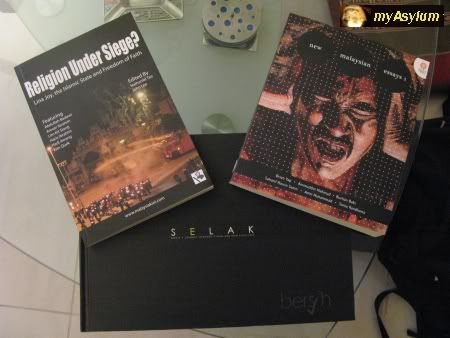 The loot - to add to a mounting pile of unread books
The loot - to add to a mounting pile of unread books
The only question now: when Walski can find the time to go thru these volumes? Then again, it's actually a good problem to have for a change...
Walski's as-if-this-weren't-a-long-enough-post afterthought footnote: Another highlight that Walski forgot to mention, in his hurry to get the post out, was getting his copy of New Malaysian Essays 1 autographed by Amir Muhammad
autographed by Amir Muhammad (who really shouldn't need any introduction), editor and contributing writer, and one other writer who's name escapes Walski for the moment (the book's at home, and Walski's not). So, thanks a lot, Amir - a warm shalom to you, too! One regret that Walski had, also not mentioned in the original posting, was not being able to meet a few other people that he'd hoped to have been able to meet - like Sharon Bakar
(who really shouldn't need any introduction), editor and contributing writer, and one other writer who's name escapes Walski for the moment (the book's at home, and Walski's not). So, thanks a lot, Amir - a warm shalom to you, too! One regret that Walski had, also not mentioned in the original posting, was not being able to meet a few other people that he'd hoped to have been able to meet - like Sharon Bakar and Dina Zaman
and Dina Zaman , both of whom Walski knows were there. Oh well... **it happens... and yes, there's always next time.
, both of whom Walski knows were there. Oh well... **it happens... and yes, there's always next time.


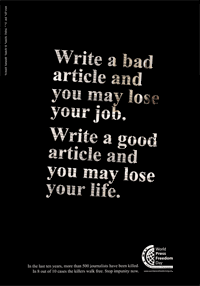
0 Comments:
Post a Comment
<< Home